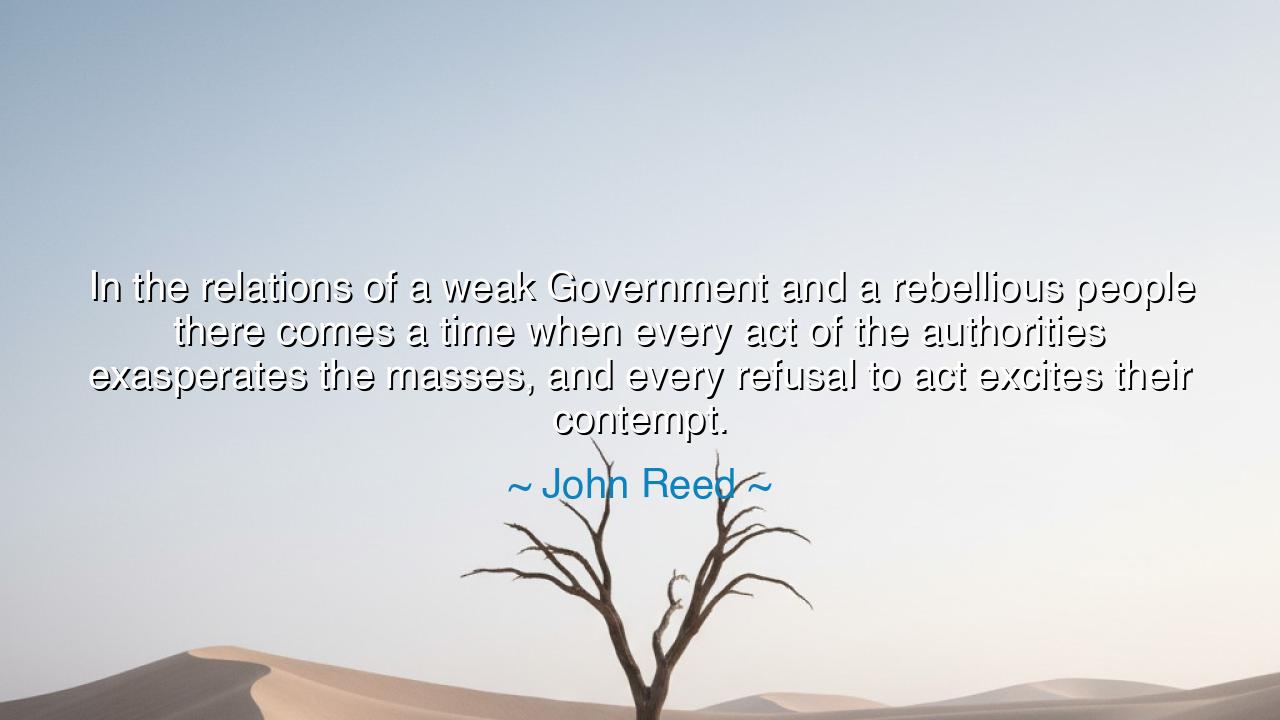
In the relations of a weak Government and a rebellious people
In the relations of a weak Government and a rebellious people there comes a time when every act of the authorities exasperates the masses, and every refusal to act excites their contempt.






"In the relations of a weak Government and a rebellious people there comes a time when every act of the authorities exasperates the masses, and every refusal to act excites their contempt." Thus wrote John Reed, the fiery chronicler of revolution, who walked among the storming crowds of Petrograd and heard the thunder of history breaking its chains. His words, carved from the living flame of experience, describe not only one moment in time, but an eternal law of politics and power. For when the Government loses its strength and the People lose their faith, a tragic cycle begins—every movement of authority becomes a wound, and every silence becomes a betrayal.
Reed spoke from the heart of chaos, from the midst of the Russian Revolution of 1917, when the old order, trembling with fear, faced a nation no longer willing to obey. The Tsar had fallen, yet the new rulers were indecisive, torn between reform and preservation. The soldiers and workers, hungry for bread and justice, looked to the Provisional Government for deliverance—but found hesitation instead. Each decree seemed to mock their suffering; each failure to act deepened their despair. In that fateful space between power and paralysis, revolution ripened. Reed saw that a weak government—one that neither rules firmly nor yields wisely—invites not obedience, but rebellion.
This is the curse of weakness in leadership: it alienates both the heart and the mind of the people. When rulers act harshly, they provoke rage; when they act timidly, they inspire contempt. And thus the bond between government and governed, once based on trust, dissolves into scorn and fury. The people no longer see their leaders as guardians, but as obstacles. The ruler becomes the enemy not because he is cruel, but because he is incompetent—because he no longer knows what justice requires, nor has the courage to seek it.
Such moments are not confined to Russia, nor to kings and revolutionaries. They recur wherever authority falters and faith dies. Recall the fall of Louis XVI in France, when the monarch, wavering between concession and command, lost both crown and country. His reforms were too little for the oppressed and too much for the privileged; his vacillation pleased no one. The poor despised his weakness, the nobles despised his mercy, and soon both sides rose against him. In that hour, every royal decree seemed foolish, every hesitation cowardly. The throne that could have been saved by courage was destroyed by indecision.
Reed’s insight, though born from the fire of revolution, carries wisdom for every generation. He teaches that the strength of government lies not in force alone, but in clarity of purpose. A ruler who acts with conviction may err, but he commands respect. One who hesitates—who seeks to please all and satisfies none—becomes the architect of his own ruin. Likewise, a people who lose patience with such weakness grow restless and wild, for when no firm hand guides them, they seek strength in rebellion. Thus the dance of weakness and wrath becomes the prelude to collapse.
Yet Reed’s words are not merely a condemnation—they are a warning to both rulers and citizens. To the rulers, he says: do not govern by fear of offending; govern by courage rooted in justice. To the people, he says: rebellion is the child of neglect—do not let your leaders drift into impotence without holding them to account. A healthy nation must balance the authority of law with the fire of conscience, lest weakness on one side and fury on the other tear it apart.
The lesson, then, is this: when government loses the trust of the governed, strength must return not through violence, but through truth and resolve. A people will forgive harshness, but never cowardice; they will endure struggle, but never betrayal. Therefore, let leaders act with wisdom that is firm, and with compassion that is strong. Let them speak clearly, decide boldly, and serve faithfully, for hesitation in the face of injustice is the surest road to downfall.
So remember, O listener, the wisdom of John Reed, the witness of revolutions: that between a weak government and a rebellious people, there lies a moment when the world itself seems to hold its breath—when every choice wounds, and every silence kills. It is in that moment that nations either perish or are reborn. May we, who inherit their lessons, choose courage over fear, and justice over delay, lest history once again record the ruin of the timid and the triumph of the bold.






AAdministratorAdministrator
Welcome, honored guests. Please leave a comment, we will respond soon